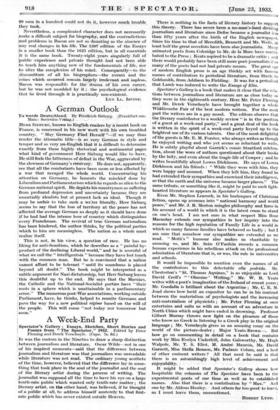A Gerthan Outlook
Es werde Deutschland: By Friedrich Sieburg. (Frankfurt-am-
' Main: Societlits-Veklag..)
HERR SIEBURG, known to English readers by a recent book on France, is concerned' in his -new- work with his- own troubled 'country. " May Germany Find Herself "—if we may thus render the idiomatic title—is so. very German in style and
-temper and so very Am-English that it is difficult to determine `exactly from these highly rhetorical and sentimental pages what kind of government Herr Sieburg would like to have. He still feels the bitterness of defeat in the War, aggravated by the slowness of Germany's reedVery. He does not, apparently, !see that all the combatants have been more or less affected by :a war that ravaged the whole world. Concentrating his
attention on Germany, he laments the mischief done -by Liberalism and Parliamentarism which he regards as alien to the
German national spirit. He depicts his countrymen as suffering 'from profound depression and uncertainty. because .they are !essentially idealists but at present lack an ideal. Though it may be unfair to take such a wr:ter literally, Herr Sieburg seems to say that the loss of territory at the peace has not :affected the average German so deeply as it should have done if he had had the intense love of country which distinguishes every Frenchman. The revival of true German nationalism I has been hindered, the author thinks, by the political parties which to him are meaningless. The nation as a whole must realize itself.
This is not, in his view, a -question of race. He has no liking for anti-Semitism, which he describes as a " painful by- : product of the declining Liberal world," and he is scornful of what we call the " intelligentsia " because they have lost touch L with the common man. But he is convinced that a nation cannot afford to be tolerant " until its soundness is placed beyond all doubt." The book might be interpreted as a ' subtle argument for Nazi dictatorship, but Herr Sieburg leaves this doubtful up to the end. He says that the Mandan, Ithe Catholic and the National-Socialist parties have "their
! roots in a sphere which is unattainable in a parliamentary sense." The numerous post-War associations, working outside Parliament, have, he thinks, helped to reunite Germans and i pave the way for a new political regime based on the will of the people. This will come "not today nor tomorrow but soon."








































 Previous page
Previous page